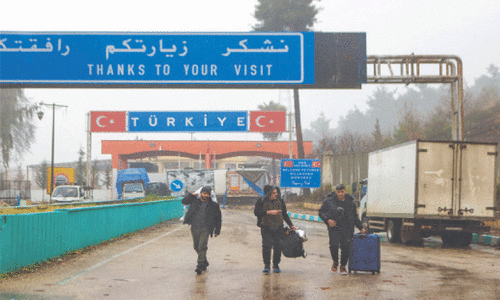LONDON: The brief, brutal war in Georgia is not a victory of the Russians over the West. That is just a schoolboy way of looking at the whole sorry episode. Nor is it, as David Miliband, the foreign secretary and would-be Labour leader, would have it, some disgraceful resurgence of Russian imperialism for which they must be punished by withdrawal of international privileges. That is to completely misunderstand the situation on the ground and in the Kremlin.
At least Moscow’s strategy is clear. It’s to reconsolidate Russia’s position and self-confidence following the humiliations of the collapse of the Soviet Union. It’s the West’s response to the end of the Cold War which has been so muddle-headed. While Mr Miliband and President Bush accuse Moscow of reverting to the behaviour of the past, it is Washington and London that have in fact continued the Cold War mindset. Russia was forced to re-evaluate its position by its dismal and humiliating experience in the 1990s. The West, for its part, regarded the fall of the Berlin Wall as a triumph on its part and directed policy towards consolidating its gains by locking in the former Soviet Republics into their associations as if we were still in a world of competing blocs.
Nato was opened up to new members, led by Russia’s ancient enemy, Poland. The EU was extended to include Poland, Hungary, the Czech Republic, Slovakia, the Baltic States and then Bulgaria and Romania. The whole process was seen not as an organic development of these institutions, or even a policy of pursuing self-interest, but as an historic process of absorption of former enemies, a steady march of democracy across a ravaged post-Cold War landscape.
The ideals may have been noble but the effect is what we are witnessing now. Nato, once a clearly-defined defensive transatlantic alliance, has been redefined as a multi-national, military force that could be used as an instrument of intervention around the world, the offensive arm of western democracies acting in concert. It is now seriously in danger of splitting apart over mutual recrimination in its Afghan deployment and in the arguments at the Bucharest summit last April over Georgian membership.
It is just as bad within the EU. What was once the most effective commercial grouping since the Hanseatic League is now beating itself to self-destruction through overhasty expansion eastwards and fundamental divisions as to its future form. The arrival of new entrants from central and eastern Europe has divided the Union on the question of Russia but also on the broader relationship with the US the division between “old Europe and new Europe” as the US Vice-President Dick Cheney so helpfully put it.
Georgia is the exemplar and the cause of many of these woes. Ever since the Rose Revolution brought democracy into being in Tbilisi in 2003, it (and Ukraine) have been used as the pawn to outside interests rather than for the good of its own people. Blazoned as the forerunner of democratic change throughout the Caucasuses and even central Asia, armed to the teeth by the US and (intriguingly) Israel, it has been induced to send troops to Iraq and Afghanistan to prove that the US has a “coalition of the willing” in its fight against terror and encouraged to take on Russia head-to-head over the enclaves.
It should have been able to take advantage of its position as the small country squeezed between big adversaries to play the one off against the other. Instead it has been induced to take sides with one over the other and got trounced in the process. It has every reason to feel let down by its allies.
But then so have we. Nato very nearly split earlier this year on the issue of offering it a fast-track to membership. Behind all the facade of peace-making determination at the summit of EU foreign ministers the other day there were deep divisions between the new east European members wanting total condemnation of Moscow and the forces of Paris and Berlin recommending caution.
It is simply hot air to talk in the terms used by the hapless Europe minister Jim Murphy, left in charge of foreign policy pronouncement as the crisis unfolded, when he argued that Georgia, or anyone else, had the right to apply for membership of Nato and the EU without Russia asserting a veto. It’s not Russia that should stop Georgia becoming a member but the institutions themselves.
Georgia has no contiguous border with the EU and meets none of the economic requirements for membership of an organisation that has already got itself into enough problems with trying to absorb Bulgaria and Romania prematurely without a new member lacking even common borders. Nato membership is even more problematic. The US wants Georgia as an inroad into the Russian sphere of influence, Georgia wants membership to give it a military backing against Russia. Yet, as Chancellor Merkel keeps pointing out, it is not in Nato’s interests to be dragged into the kind of territorial squabble that we have just witnessed.Punishing Russia for its actions would only serve further to damage our own interests for the sake of disguising our impotence. The military co-operation now halted was primarily concerned with disabling nuclear arsenals. The EU-Russian economic association discussions have as a main spring talks on energy security of crucial importance to ourselves. Worst of all is the step of holding G7 meetings without Russia. The G8 is an association of industrialised nations aimed at improving international co-operation on economic issues. Never has that co-operation been more needed.
Russia does pose a problem to Europe and the West. Its fierce form of nationalism poses a host of questions about resources, defence and the future of a whole host of individual countries through the Caucasuses and central Asia. But until we make up our own minds of what it is that we represent and what our associations are for, we’ll never be able to meet that challenge. It’s not the Cold War we’re returning to, but the bitty, brutal and shifting world of the 19th century. Only we don’t have the gunboats to control it.—Dawn/ The Independent News Service














































Dear visitor, the comments section is undergoing an overhaul and will return soon.